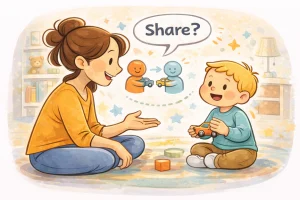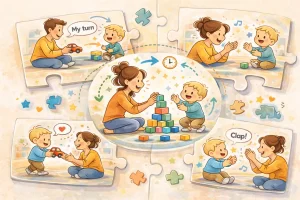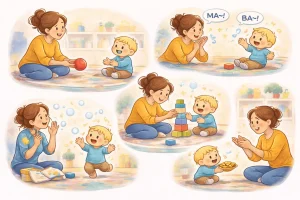Speech Still Unclear at Age 5? What Parents Can Do Next
Last Updated: September 5, 2025
Has your 5-year-old’s speech still not become clear? Many parents wonder, “Should a 5 year old speak clearly by now?” By age five, children are expected to reach major speech milestones—they should be able to form full sentences, pronounce most sounds correctly, and be understood by strangers about 90% of the time. But if your child’s speech is still unclear at age 5, you’re not alone.
Unclear speech doesn’t always mean something serious, but it can be a sign of articulation disorder, phonological processes, hearing issues, or even childhood apraxia of speech. Knowing the difference between what’s typical and what’s a red flag is the first step.
Free Speech Help for Kids
Concerned about speech delays? Book a free consultation with our expert speech therapist and get guidance tailored to your child’s needs.
Should a 5 Year Old Speak Clearly?
By the age of five, most children reach important speech milestones that make their communication much easier to understand. Experts in child development often say that a 5 year old’s speech clarity should be high enough for both family and strangers to follow most of what the child says. In fact, research shows that by this age, children should be understood by everyone about 90% of the time.
That said, it’s also normal for some sounds to still be tricky. The R, L, S, and TH sounds are among the last to develop, which means many 5 year olds may substitute or mispronounce them. For example, “rabbit” might come out as “wabbit,” or “thumb” may sound like “fum.” While these errors are common, parents should notice steady progress in overall clarity as their child grows.
If your child is mostly understood but still struggles with a few difficult sounds, it’s usually part of normal development. But if your child’s speech is often unclear to teachers, classmates, or people outside the family, it could be a sign that extra support is needed. Understanding speech clarity at age 5 helps parents know what’s typical and when to seek guidance.
Why Is My 5 Year Old’s Speech Still Unclear? (Causes)
Parents often ask about the causes of unclear speech at age 5, especially when their child is otherwise bright and talkative. While some sound errors are normal, persistent difficulty being understood may point to an underlying issue. Here are the most common reasons a 5 year old’s speech is not clear:
1. Articulation Issues
An articulation disorder in a 5 year old means the child struggles with producing specific sounds. These are not language problems but rather pronunciation problems in children—such as leaving off sounds, substituting one sound for another, or having a noticeable lisp. For example, saying “tat” instead of “cat” or “thun” instead of “sun.”
2. Phonological Processes
Sometimes the issue isn’t the ability to make a sound but how a child organizes sounds in speech. This is called a phonological disorder at age 5. Common processes include:
- Fronting: saying “tat” for “cat.”
- Stopping: saying “tun” for “sun.”
- Cluster reduction: saying “pane” for “plane.”
These patterns are normal in toddlers but usually fade by age 5. If they persist, speech clarity suffers.
3. Hearing Problems
Children with even mild hearing loss may not clearly hear speech sounds, which impacts how they speak. Chronic ear infections or fluid in the ear (glue ear) are common culprits. That’s why a hearing test for speech delay is often recommended when speech clarity doesn’t improve as expected.
4. Childhood Apraxia of Speech (Motor Planning)
In some cases, unclear speech is linked to childhood apraxia of speech, a motor planning disorder. The child knows what they want to say, but their brain has difficulty planning the muscle movements needed for clear speech. This can make their speech inconsistent and harder to understand.
5. Oral Motor Issues or Tongue Tie
Structural differences, such as weak oral motor skills or a tongue tie, can also affect speech clarity. A child may have trouble with tongue placement or movement, which makes certain sounds—like R, L, or TH—difficult to pronounce.
Red Flags Parents Shouldn’t Ignore
It’s natural for parents to wonder when to worry about speech in a 5 year old. While every child develops at their own pace, there are some red flags for speech at 5 years that should not be overlooked. If your child shows several of these signs, it may be time to seek an evaluation from a speech-language pathologist (SLP).
Signs That Warrant Attention
- Your child is still hard to understand most of the time, even by family members.
- Teachers, friends, or strangers often say your child’s speech is unclear.
- Your child struggles to put sentences together or leaves out important words.
- Persistent speech delay at 5 years old compared to peers in class.
- Difficulty pronouncing sounds most children have mastered (like P, B, M, K, G).
- Ongoing errors with tricky sounds (R, L, S, TH) without gradual improvement.
- Frustration, tantrums, or withdrawal when trying to communicate.
- Limited vocabulary growth or difficulty following simple directions.
- A history of frequent ear infections or suspected hearing problems.
- Family or teacher concerns about your child being “too hard to understand.”
Why These Red Flags Matter
Many children with a speech delay at 5 years old benefit from early help. The earlier an SLP evaluates and starts therapy, the faster children can catch up and build clear, confident communication skills. Waiting too long may make it harder for your child in school, social settings, and friendships.
Home Strategies to Improve Speech Clarity
If you’re wondering how to help a 5 year old speak more clearly at home, the good news is that small, consistent activities can make a big difference. While professional support may be needed for some children, parents can start building daily routines that encourage clearer speech. Here are some simple, practical speech therapy activities for 5 year olds at home:
1. Model Clear Speech
Children learn best by imitation. Slow down slightly when you talk, pronounce words clearly, and use short, simple sentences. If your child says “tat” for “cat,” respond with, “Yes, that’s a cat!” without forcing them to repeat it right away. Over time, hearing the correct model helps reinforce clear pronunciation.
2. Practice Tricky Sounds
Some sounds—like R, L, S, and TH—can still be challenging at age 5. Set aside a few minutes daily to practice words with these sounds in a fun, playful way. For example, say “rabbit,” “lion,” or “sun,” and encourage your child to repeat after you while looking in a mirror.
3. Use Minimal Pairs
Minimal pairs are word sets that differ by just one sound, like “cat” and “hat” or “sun” and “fun.” Practicing these pairs helps children hear and produce the difference more accurately. Turn it into a game by using flashcards, toys, or picture books.
4. Read Aloud Together
Reading aloud is one of the best home exercises to improve speech clarity. Choose short, repetitive books with rhymes or clear sound patterns. Pause occasionally to let your child repeat a word or finish a sentence. This builds both vocabulary and articulation skills.
5. Home Strategies to Improve Speech Clarity
If you’re wondering how to help a 5 year old speak more clearly at home, the good news is that small, consistent activities can make a big difference. While professional support may be needed for some children, parents can start building daily routines that encourage clearer speech. Here are some simple, practical speech therapy activities for 5 year olds at home:
1. Model Clear Speech
Children learn best by imitation. Slow down slightly when you talk, pronounce words clearly, and use short, simple sentences. If your child says “tat” for “cat,” respond with, “Yes, that’s a cat!” without forcing them to repeat it right away. Over time, hearing the correct model helps reinforce clear pronunciation.
2. Practice Tricky Sounds
Some sounds—like R, L, S, and TH—can still be challenging at age 5. Set aside a few minutes daily to practice words with these sounds in a fun, playful way. For example, say “rabbit,” “lion,” or “sun,” and encourage your child to repeat after you while looking in a mirror.
3. Use Minimal Pairs
Minimal pairs are word sets that differ by just one sound, like “cat” and “hat” or “sun” and “fun.” Practicing these pairs helps children hear and produce the difference more accurately. Turn it into a game by using flashcards, toys, or picture books.
4. Read Aloud Together
Reading aloud is one of the best home exercises to improve speech clarity. Choose short, repetitive books with rhymes or clear sound patterns. Pause occasionally to let your child repeat a word or finish a sentence. This builds both vocabulary and articulation skills.
When to See a Speech Therapist
Sometimes home practice isn’t enough, and parents wonder when to see a speech therapist for a 5 year old. The simple rule is this: if your child’s speech is still unclear to teachers, friends, or people outside your family—or if communication struggles are causing frustration—it’s time to seek professional support.
A speech therapist for 5 year olds (also called a speech-language pathologist, or SLP) will begin with an evaluation. This usually includes:
- Speech sound disorder screening – checking how well your child produces and uses sounds.
- Articulation testing – identifying specific sounds your child cannot pronounce correctly (like “R” or “S”).
- Phonological disorder assessment – determining if sound errors follow patterns, such as replacing entire groups of sounds.
- Oral-motor and hearing checks – ruling out issues like weak muscles, tongue tie, or hearing loss.
After the evaluation, the therapist will design a personalized therapy plan. This may involve direct sessions, play-based exercises, and guidance for parents to continue practice at home.
Why Early Support Matters
Starting speech therapy for a 5 year old can make a big difference. Early intervention helps children correct errors before they impact reading, spelling, and confidence in school. Many schools also provide speech support through an Individualized Education Program (IEP) if your child qualifies. This ensures they get help both in class and in therapy sessions.
Conclusion
If your 5 year old’s speech is still unclear, don’t panic. Many children just need more time or simple practice at home. The benefits of early intervention are huge—starting support early helps kids speak clearly, gain confidence, and do better in school. Parents can try therapy activities at home, read together, or use fun speech apps. But if you still worry, it’s best to consult a speech therapist for a clear plan. With patience, home practice, and professional help, your child can move from unclear speech to confident communication—and you’ll celebrate every word.
Frequently Asked Questions:
1. Should a 5 year old be understood by everyone?
By age 5, most children should be understood by strangers about 90% of the time. If your child’s speech is still unclear to teachers or friends, it may be time to check with a speech therapist.
2. Why is my 5 year old’s speech still unclear?
Unclear speech at age 5 can be caused by articulation issues, phonological patterns, hearing problems, tongue tie, or childhood apraxia of speech.
3. Is a lisp normal at age 5?
A mild lisp can be common at age 5, but if it doesn’t improve or affects many sounds, an SLP evaluation is helpful.
4. What speech milestones should a 5 year old reach?
At this age, children should use full sentences, have a growing vocabulary, and pronounce most sounds correctly, except some tricky ones like R, L, S, and TH.
5. When should I worry about my 5 year old’s speech?
If your child is still hard to understand, avoids talking, or shows no progress in clarity, it’s a sign to seek professional help.
6. Can hearing problems cause unclear speech in children?
Yes. Even mild hearing loss can make it hard for children to hear and copy sounds correctly. A hearing test is often recommended.
7. How can I help my 5 year old speak more clearly at home?
Model clear speech, read aloud daily, practice tricky sounds, use minimal pairs, and try fun speech apps designed for kids.
8. Does my child need speech therapy at age 5?
If unclear speech affects learning, friendships, or daily life, then yes—speech therapy for 5 year olds can make a big difference.
9. How long does it take for speech therapy to work?
Every child is different. Some improve in a few months, while others need longer support. Early intervention usually speeds up progress.
10. Can bilingual children have unclear speech at age 5?
Bilingual children may mix languages at first, but if speech clarity is poor in both languages, an SLP check is recommended.
About the Author:
Anuradha Karanam
Speech-language pathologist (7+ years of experience)
Anuradha Karanam is a skilled speech-language pathologist with over 6 years of experience. Fluent in Tamil, Telugu, Hindi, and English, she specializes in parent counseling, speech sound disorders, fluency assessment, and speech-language evaluations. Anuradha excels at working with children with developmental disorders, offering creative and effective therapy programs. Currently, at Wellness Hub, she holds a BASLP degree and is registered with the RCI (CRR No A85500). Her patience, ambition, and dedication make her a trusted expert in her field.
Book your Free Consultation Today
Parent/Caregiver Info:
Client’s Details:
* Error Message









